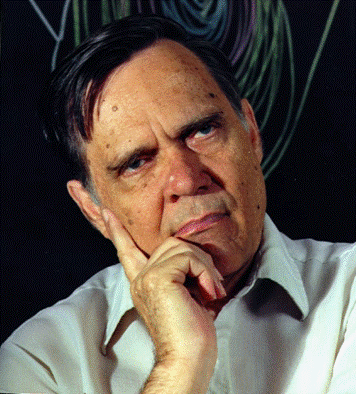
Joe came to the field of chaotic dynamics after having been
diverted fro traditional statistical mechanics by his curiosity in the
Fermi-Pasta-Ulam paradox. As early as 1963 he discovered a new
phenomenon, namely a transition from regular motion to dynamical
chaos. In those pioneering days Joe realized, more clearly than
most, the profundity and importance of this phenomenon.
As related ideas emerged from widely diverse fields, he served as a catalyst and focal point for developments that altered the course of practically all areas of physics, ranging from astrophysics and celestial mechanics to atomic, molecular and nuclear physics, and now extending beyond to biology and finance.
As activity in nonlinear dynamics expanded, in the 1970s Joe conceived the idea of Nonlinear Science Abstracts. He personally collected, organized, typed, copied and distributed volumes of abstracts of dynamics papers, and thereby forged a global and interdisciplinary community which is such a force in physics today. His deep and warm personal friendships with many other scientists date back to those heroic days. Eventually, Joe's tireless efforts resulted in the foundation of the first journal devoted to nonlinear dynamics, Physica D.
Joe's ruling passion was the establishment of an empirical criterion for chaos based on the strong exponential instability of motion. His deep physical intuition suggested very early on that such an instability was the most important property of the new dynamics. This allowed him to isolate it from many other ( and often confusing) characteristics of nonlinear phenomena. Since then his approach has become a standard for judging chaos. Joe himself applied it to the famous Toda lattice, a highly nonlinear, many-dimensional model, and gave a computer proof of its integrability, a surprising development that stimulated intensive investigations of integrable nonlinear systems. Another key discovery by Joe was that strong chaos can exist even in a nearly linear oscillator for arbitrarily weak nonlinear perturbations.
As the chaotic dynamics community gained in size and acceptance, Joe started to pursue philosophical ideas to explore the deeper consequences of deterministic chaos and yet again he found himself in the role of pioneer. Gödell and Turing supplanted Poincaré in his daily thinking. He realized that the concept of chaos transcends the domains of mappings and differential equations, and repeatedly drew attention to "algorithmic complexity" - a concept also rooted in the notion of exponential instability - as a means of defining and assessing the fundamental limits of human ability to deal with chaotic systems. Armed with this tool, Joe not only perceived but demonstrated by computer experiment that dynamical chaos as it is understood in classical mechanics (and implemented in ergodic theory in mathematics) does not exist in quantum mechanics. As a genuine scientist, Joe did not flinch: He courageously proceeded to challenge the very basis of quantum mechanics itself. Sadly, this daring flight was cut short by his death.
Joe’s personality was strongly reflected in his work.
He was a son of the Old South, that curious mixture of fierce rebel and old-world gentleman. In issues of integrity and quality he was particularly uncompromising. On the other hand, his generosity and kindness to his friends, old or young, eminent or humble, knew no bounds. His marked anti-authoritarian streak undoubtedly contributed to the originality of his work. Joe was a passionate man whose zest for living was only surpassed by his passion for his work--indeed, he was compulsive about it. He cared deeply about writing well and speaking effectively. He had a remarkable ability to put his views and insights into lapidary form, and his speech owed much to the Southern Evangelists whom he must have heard when growing up in the rural South during the Depression .
At the same
time his generosity to his friends knew no bounds. His marked
anti-authoritarian streak undoubtedly contributed to the originality of
his work. He was a passionate man whose zest for living was
surpassed only by his passion for his work.
Joe was born December 18, 1927 in Ashville, Buncombe County, North Carolina.
He served in the Navy during World War II.
He received his BS degree from Georgia Tech in
1952 and his Ph.D. in physics from Johns Hopkins University in 1956,
specializing in statistical mechanics.
He was a student of Ted Berlin, a theorist in statistical mechanics.
After two years as a
research physicist at Union Carbide Corp., in Niagara Falls, NY, he
launched his academic career at the University of Miami in 1958.
He returned to Georgia Tech as associate professor in 1961 and rose
through the ranks to become Regents’ Professor of Physics in 1978.
From September of 1973 through December of 1973,
he was awarded a NATO Senior Fellowship at the University of Milano.
Joe died April 26, 1995.
[excerpted from the October 1995 Physics Today obituary by T. Uzer, Georgia Tech; Boris Chirkov, Budker Institute of Nuclear Physics, Novosibirsk; Franco Vivaldi, Queen Mary College, London; and Giulio Casati. University of Milan]